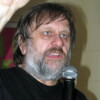Slavoj Zizek

Slavoj Zizek
Slavoj Žižek; born 21 March 1949) is a Slovenian psychoanalytic philosopher, cultural critic, and Hegelian Marxist. He is a senior researcher at the Institute for Sociology and Philosophy at the University of Ljubljana, Global Distinguished Professor of German at New York University, and international director of the Birkbeck Institute for the Humanities of the University of London. His work is located at the intersection of a range of subjects, including continental philosophy, political theory, cultural studies, psychoanalysis, film criticism, and...
ProfessionPhilosopher
Date of Birth21 March 1949
My instinct as a philosopher is that we are effectively approaching a multicentric world, which means we need to ask new, and for the traditional left, unpleasant questions.
Those who were still able to write beautiful melodies were kitsch composers like Tchaikovsky. Tchaikovsky approaches true art not in his numerous beautiful melodies, but when a melodic line is thwarted.
We have all the freedoms we want. But what we are missing is red ink: the language to articulate our non-freedom. The way we are taught to speak about freedom- war on terror and so on-falsifies freedom.
Did Wagner really accomplish the first step towards the kitschy 'fetishization' of music that reaches its apogee in classical Hollywood?
We usually speak of the Jewish-Christian civilization perhaps, the time has come, especially with regard to the Middle East conflict, to talk about the Jewish-Muslim civilization as an axis opposed to Christianity.
With Lenin it was always a substantial commitment. I always have a certain admiration for people who are aware that somebody has to do the job. What I hate about these liberal, pseudo-left, beautiful soul academics is that they are doing what they are doing fully aware that somebody else will do the job for them.
I may still be a kind of a Marxist but I'm very realistic, I don't have these dreams of revolutionists around the corner.
The fantasy which serves as a support for the figure of the Stalinist Communist is therefore exactly the same as the fantasy which is at work in the Tom and Jerry cartoons.
Zionism itself has paradoxically come to adopt some antisemitic logic in its hatred of Jews who do not fully identify with the politics of the state of Israel. Their target, the figure of the Jew who doubts the Zionist project, is constructed in the same way as the European antisemites constructed the figures of the Jew – he is dangerous because he lives among us, but is not really one of us.
The same rightists who decades ago were shouting, 'Better dead than red!' are now often heard mumbling, 'Better red than eating hamburgers.
Our biological body itself is a form of hardware that needs re-programming through tantra like a new spiritual software which can release or unblock its potential.
It is more satisfying to sacrifice oneself for the poor victim than to enable the other to overcome their victim status and perhaps become even more succesfull than ourselves
The problem for me is not that Schwarzenegger is governor, but the extent to which even politicians who are not actors are functioning like actors.
Ideology today is unfreedom which you sincerely personally experience as freedom.